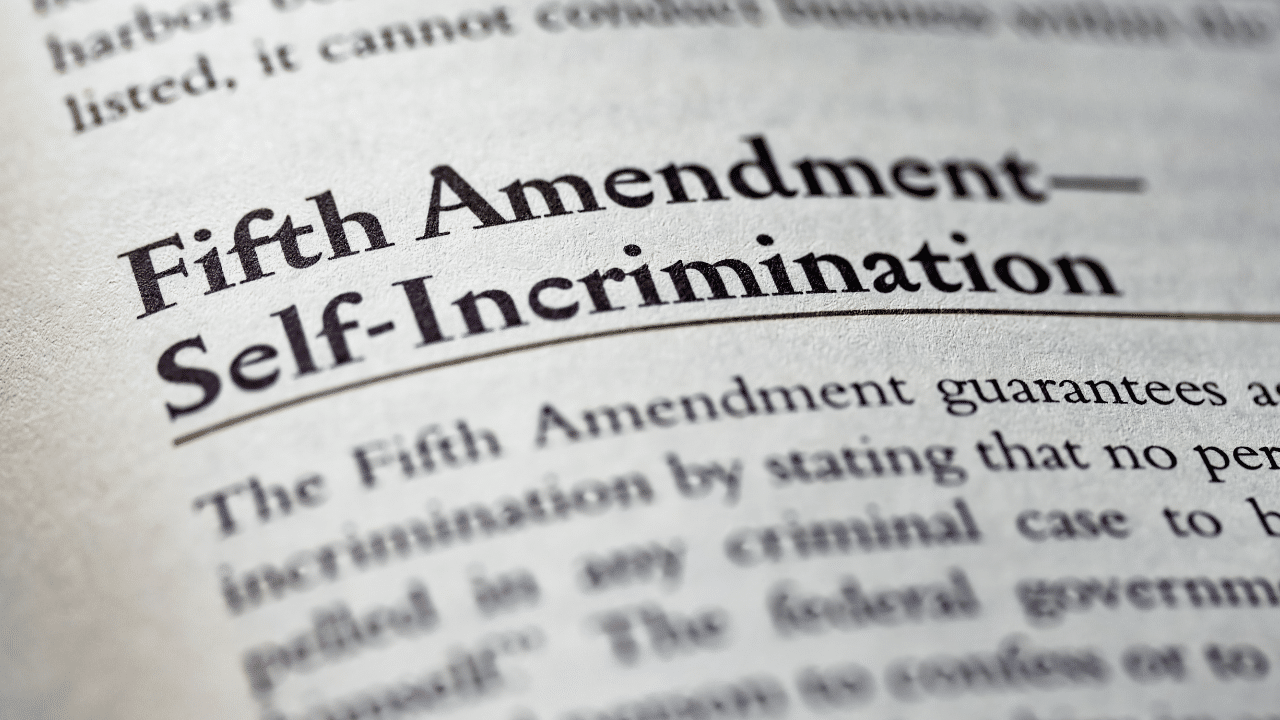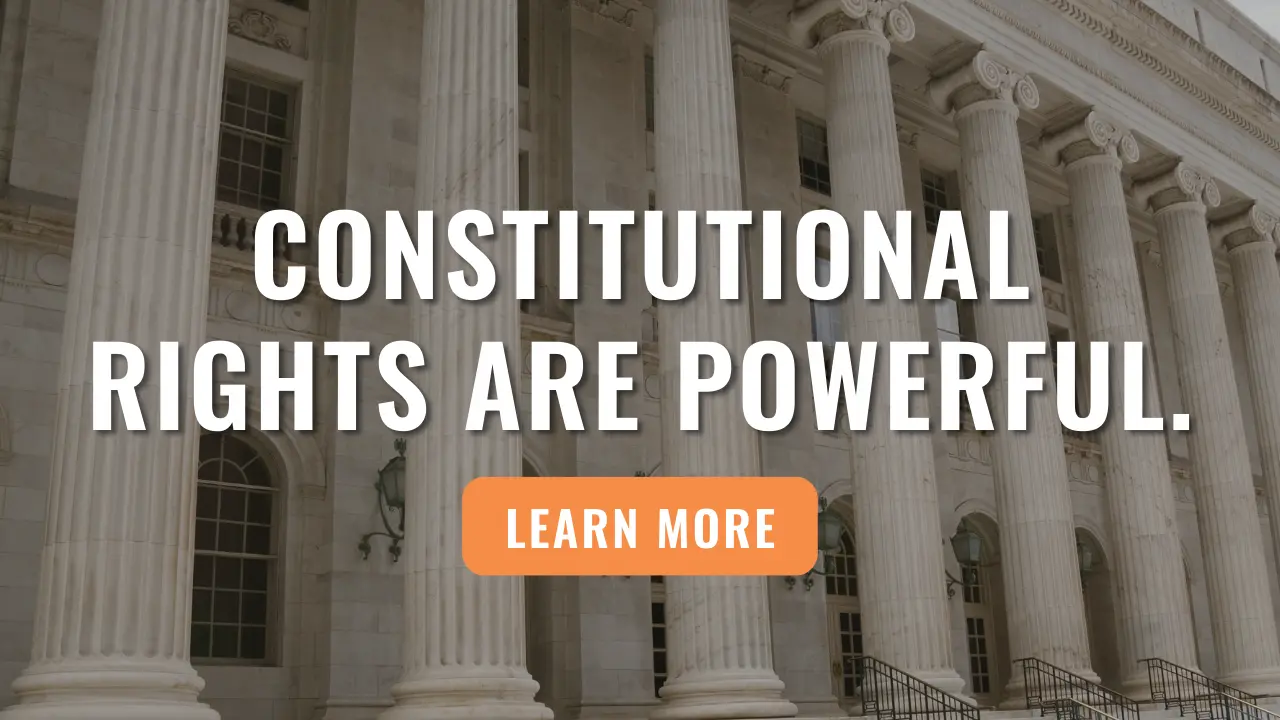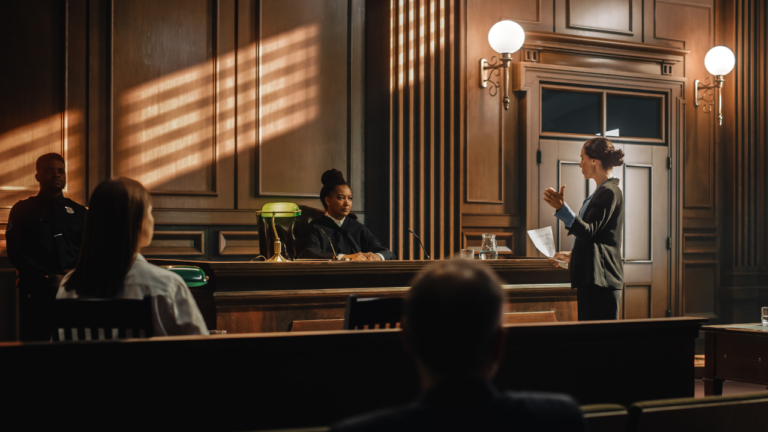
The Fifth Amendment to the United States Constitution protects individuals by preventing the government from abusing its prosecutorial powers. The Fifth Amendment contains five protections for individuals who find themselves at odds with the government, whether through criminal accusations, or the government’s attempted eminent domain.
The Fifth Amendment requires the presentment or indictment by a Grand Jury to begin criminal prosecutions of individuals accused of a capital “or otherwise infamous crime.” Amendment five also prevents the government from re-prosecuting a person for a crime of which he or she has already been acquitted.
The right against self-incrimination protects a person from having to testify or speak while in custody against him- or herself. The Fifth Amendment Due Process Clause guarantees procedural due process and substantive due process. Procedural due process requires the federal government to provide notice and a hearing before depriving a person of a protected life, liberty, or property interest. Substantive due process protects certain fundamental constitutional rights from federal government interference in specific subject areas such as liberty of contract, marriage, or privacy.
The Fifth Amendment Takings Clause requires the government to pay “just compensation” to owners of private property that the government takes for public use.
WHAT IS THE TEXT OF THE FIFTH AMENDMENT TO THE UNITED STATES CONSTITUTION?
U.S. Const. Amend. V. GRAND JURY INDICTMENT FOR CAPITAL CRIMES; DOUBLE JEOPARDY; SELF-INCRIMINATION; DUE PROCESS OF LAW; TAKINGS WITHOUT JUSTIFICATION.
No person shall be held to answer for a capital, or otherwise infamous crime, unless on a presentment or indictment of a Grand Jury, except in cases arising in the land or naval forces, or in the Militia, when in actual service in time of War or public danger; nor shall any person be subject for the same offence to be twice put in jeopardy of life or limb; nor shall be compelled in any criminal case to be a witness against himself, nor be deprived of life, liberty, or property, without due process of law; nor shall private property be taken for public use, without just compensation.
WHAT IS THE HISTORY AND CONTEXT OF THE FIFTH AMENDMENT IN THE BILL OF RIGHTS?
The five clauses in the Fifth Amendment find their roots in English history, with its original “law of the land” language from the Magna Carta. However, the drafting and ratification history is notoriously sparse. The Amendment, like the other provisions in the Bill of Rights, originated with calls from state ratifying conventions. But little is known about the circumstances of the drafting, or why James Madison chose the words “due process.” See Thomas Y. Davies, The Fictional Character of Law-and-Order Originalism: A Case Study of the Distortions and Evasions of Framing-Era Arrest Doctrine in Atwater v. Lago Vista, 37 Wake Forest L. Rev. 239–437 (2002).
The Framers of the U.S. Constitution, including John Adams, Thomas Jefferson, and James Madison, recognized the importance of protecting individual liberties from government intrusion. Their intention, made clear by the Preamble, was to “form a more perfect Union, establish Justice, insure domestic Tranquility, provide for the common defense, and promote the general Welfare.”
To assuage the Democratic-Republicans and Anti-Federalists, framer James Madison drafted the first ten constitutional amendments, known as the Bill of Rights, based on the desire to avoid another tyrannical government they had fought so hard against. The Federalist party secured the ratification of the U.S. Constitution by promising the addition of amendments codifying fundamental liberties outlined in the Bill of Rights.
The Bill of Rights guarantees fundamental freedoms often restrained by despotic, oppressive governments. It encompasses “the great rights” such as the 6th amendment and 7th amendment right to trial by jury, the first amendment freedom of speech and the press, the second amendment right to keep and bear arms, the fourth amendment right to be free from unreasonable government searches and seizures, and the 5th amendment protection against self-incrimination. They are considered the “choicest privileges of the people” in the United States, and are protected from government overreach.
The first ten amendments were proposed to several state legislatures by the First Congress on September 25, 1789. New Jersey was the first State to ratify the Bill of Rights on November 20, 1789, followed by Maryland, North Carolina, South Carolina, New Hampshire, Delaware, Pennsylvania, New York, and Rhode Island in 1790. Vermont and Virginia ratified the Bill of Rights in 1791, resulting in its adoption. The Legislatures of Connecticut, Georgia, and Massachusetts held out on ratification until 1939.
WHAT IS THE FIFTH AMENDMENT GRAND JURY CLAUSE?
The Fifth Amendment right to “presentment or indictment of a Grand Jury” for a “capital, or otherwise infamous crime,”provides a check on government-initiated prosecutions of the accused. The right to indictment by a grand jury has not been incorporated through the Fourteenth Amendment to apply to the States, but each state legislature has enacted a similar state law creating a grand jury system to protect its citizenry from frivolous prosecutions.
What is a grand jury?
A grand jury is a group of men and women selected and summoned to serve before a competent court and charged to inquire with regard to crimes committed within its jurisdiction, and to present all offenders against the law. The grand jury has an ancient role in determining if there is probable cause to believe that a crime has been committed, and a related responsibility of protecting citizens against unfounded criminal prosecutions.
History of the Grand Jury
The history of the grand jury is rooted in the common and civil law, extending back to Athen, pre-Norman England, and the Assize of Clarendon promulgated by Henry II. The right to indictment by a grand jury was included in James Madison’s first draft of the Bill of Rights, and elicited no debate and no recorded opposition.
The grand jury is an English institution, brought to America by the early colonists and incorporated in the Constitution by the Founders. The basic purpose of the English grand jury was to provide a fair method for instituting criminal proceedings against persons believed to have committed crimes. Grand jurors were selected from the body of the people and their work was not hampered by rigid procedural or evidential rules. Costello v. U.S., 350 U.S. 359 (1956).
The adoption of the grand jury in the Constitution as the sole method for preferring charges in serious criminal cases shows the high place it held as an instrument of justice. And in America, as in England of old, the grand jury has convened as a body of laymen, free from technical rules, acting in secret, pledged to indict no one because of prejudice and to free no one because of special favor. Costello v. U.S., 350 U.S. 359 (1956).
What is the purpose of a grand jury?
The grand jury serves a dual function. First, it determines if there is probable cause to believe that a person has committed a crime so that he or she should be formally charged, or “indicted,” and required to stand trial. If the grand jury votes there is probable cause to believe a person committed an “infamous crime,” it files a charge, and causes a prosecution. The second function is to protect citizens against unfounded prosecutions. A grand jury is thus an inquisitorial, informing, and accusing body, not a body before which a trial occurs.
What is an “infamous crime”?
By its terms, the Grand Jury Clause applies to “capital” or “otherwise infamous” crimes. Whether a crime qualifies as infamous depends on the possible punishment that could be imposed. A crime punishable by imprisonment in a state prison, federal penitentiary, or a non-penitentiary “workhouse” qualifies as infamous, requiring a grand jury indictment to initiate prosecution proceedings. See U.S. v. Moreland, 258 U.S. 433 (1922); Ex parte Wilson, 114 U.S. 417 (1886). By contrast, the U.S. Supreme Court has held that conduct punishable by a fine of not more than $1,000 or imprisonment for not more than six months can be tried without indictment. Duke v. U.S., 301 U.S. 492 (1937).
Does the 5th Amendment apply to military?
Amendment five contains a military exception that renders the right a grand jury inapplicable to court-martial proceedings, and leaving such cases for military tribunals. The rights are thus preserved for everyone accused of a crime, except those attached to the army, navy, or militia in actual service.
When a serviceman is charged with an offense committed within or at the geographical boundary of a military post and violative of the service of a person or property there, such offense is service-connected, and may be tried by a court-martial. Relford v. Commandant, 401 U.S. 355 (1971) There need be no indictment for such military offenses, since Congress can authorize military tribunals to try under its power to make rules to govern armed forces.
WHAT IS THE FIFTH AMENDMENT DOUBLE JEOPARDY CLAUSE?
The Fifth Amendment’s Double Jeopardy Clause protects a person from being “twice put in jeopardy of life or limb” “for the same offence.” It protects against a second prosecution for the same offense after acquittal, a second prosecution for the same offense after a conviction, and multiple punishments for the same offense.
What is the purpose of double jeopardy?
The purposes served by the constitutional prohibition against double jeopardy include protection against the hazards of trial and possible conviction more than once for the same offense, preservation of the finality of judgments, and deprivation of an opportunity for the prosecution to supply evidence at a successive trial that it failed to present the first time around. In other words, the purpose of the Clause is to protect a person who has been acquitted from having to run the gauntlet a second time. Ashe v. Swenson, 397 U.S. 436 (1970).
When people are exposed to multiple prosecutions for the same crime, they are subject to embarrassment, expense, and ordeal, and are compelled to live in a continued state of anxiety and insecurity. Such persecution also enhances the possibility that an innocent person may be found guilty.
How does double jeopardy work?
The Double Jeopardy Clause prohibits: (1) subsequent prosecutions for the same offense after an acquittal or its equivalent; (2) subsequent prosecutions for the same offense after a conviction; and (3) multiple punishments for the same offense.
The first and second double jeopardy protections bar a second prosecution for a single act after jeopardy attached in a previous prosecution. Courts use the test articulated by the United States Supreme Court in Blockburger v. United States to determine whether the same transaction violates two distinct statutory provisions—the question is whether each provision requires proof of a fact that the other does not.
In Brown v. Ohio, the defendant stole a car from a parking lot in East Cleveland, Ohio, and was arrested for “joyriding” nine days later in Wickliffe, Ohio. He was convicted of “joyriding” (driving the car without the owner’s consent), and served jail time. He was then convicted in East Cleveland of auto theft for stealing the same car. He argued a double jeopardy violation, and the U.S. Supreme Court agreed. Joyriding requires proof of operating the vehicle without the owner’s consent, and auto theft is joyriding with intent to permanently deprive the owner of the car. Because joyriding is a lesser-included offense of auto theft, convictions for both violate double jeopardy.
The third double-jeopardy protection prohibits multiple punishments in a single prosecution. If the same act or transaction violates two distinct statutory provisions, multiple charges an punishments in a single prosecution do not violate double jeopardy if a “clearly expressed legislative intent” supports the imposition of cumulative punishments. Missouri v. Hunter, 459 U.S. 359 (1983).
In United States v. Woodward, the defendant flew into the U.S. carrying over $20,000 in cash. On the Customs form, he checked the “no” box when asked if he was carrying over $5,000. He was convicted of making a false statement to a U.S. agency under 18 U.S.C. § 1001, and willfully failing to report bringing over $5,000 into the U.S. under 31 U.S.C. §§ 5316 and 5322. The Supreme Court held the defendant could be convicted of both without violating double jeopardy, because the statutes are directed at punishing separate evils. The currency reporting statute is to develop records useful in criminal, tax, or regulatory investigations, while the false statement statute is to protect governmental departments and agencies from deceptive practices.
When does double jeopardy apply?
The Double Jeopardy Clause, although it only mentions harms to “life of limb,” has been interpreted to apply to criminal punishments for the same offense, rather than to civil sanctions. The protection extends to felonies, minor crimes, and misdemeanors, and includes the potential punishments of imprisonment and monetary penalties. Whether a sanction is civil or criminal depends on: (1) whether the state legislature or Congress intended to establish a civil or criminal penalty; and (2) whether the statutory scheme was so punitive either in purpose of effect as to “transform what was clearly intended as a civil remedy into a criminal penalty.” Hudson v. U.S., 522 U.S. 93 (1997).
In Department of Revenue of Montana v. Kurth Ranch, the Kurth family was prosecuted in a Montana State court for cultivating marijuana on their grain and livestock farm, and selling it. The county attorney also filed a civil forfeiture action in which the defendants forfeited over $18,000 in cash and growing equipment. The Montana Department of Revenue then attempted to collect almost $900,000 in taxes on the marijuana plants and other substances. The U.S. Supreme Court held civil penalties and taxes may, under certain circumstances, be fairly characterized as punishment, and are therefore jeopardy-barred by a prior conviction or punishment for the same conduct.
Does double jeopardy apply to a mistrial or hung juries?
Generally, no. The Double Jeopardy Clause does not prohibit a retrial following a deadlocked jury or mistrial if, taking all the circumstances into consideration, there is a manifest necessity for declaring a mistrial, or the ends of public justice would otherwise be defeated by not allowing a mistrial. Arizona v. Washington, 434 U.S. 497 (1978). The trial judge has the discretion to declare a mistrial if necessary, and the case may be retried unless the prosecutor or judge engaged in conduct intended to “goad” the defendant into moving for a mistrial. Oregon v Kennedy, 456 U.S. 667 (1982).
However, once jeopardy attaches, the Double Jeopardy Clause prohibits retrial after a dismissal sought by the prosecution, or anything that operates as an acquittal, unless the availability of reconsideration has been plainly established by a pre-existing rule or case authority expressly applicable to mid-trial rulings on the sufficiency of the evidence. Smith v. Massachusetts, 543 U.S. 462 (2005).
In Yeager v. United States, the defendant was charged with securities and wire fraud, money laundering, and insider trading. He was acquitted of the fraud counts, but the jury hung on the money laundering and insider trading counts. The Government re-charged him with the counts on which the jury hung, but he moved to dismiss based on double jeopardy. The U.S. Supreme Court held the defendant could be legally retried for the money laundering and insider trading because the hung jury was not the same as an acquittal. The acquittal precludes relitigating the fraud charges, but the other charges may be re-prosecuted.
What is collateral estoppel?
“Collateral estoppel,” or issue preclusion, means that when an issue of ultimate fact has once been determined by a valid and final judgment, that issue cannot be litigated between the same parties in any future lawsuit. For collateral estoppel to apply, two conditions must be satisfied: (1) the second prosecution must involve the same parties as the first; and (2) the issue sought to be foreclosed must have been previously determined by a valid and final judgment. Ashe v. Swenson, 397 U.S. 436 (1970).
In Bravo-Fernandez v. United States, the defendant was convicted of federal-program bribery, and acquitted of conspiracy. The intermediate appellate court reversed the conviction due to a jury charge error, and the Government attempted to retry the defendant for the charges on which he was convicted. The defendant moved to dismiss based on double jeopardy. The U.S. Supreme Court reiterated the issue-preclusion component of the Double Jeopardy Clause bars a second contest of an issue of fact or law raised and resolved by a prior judgment. In this case, the legal error was unrelated to evidentiary sufficiency, and not irreconcilable with the charge on which he was acquitted.
What are examples of double jeopardy?
The Double Jeopardy Clause is the constitutional prohibition against the government, with all its resources and powers, from making repeated attempts to convict an individual for an alleged offense. The U.S. Supreme Court has been guided by history and equity when determining whether multiple prosecutions or punishments violate double jeopardy.
In Ashe v. Swenson, three to four armed masked men robbed a poker game with six participants, then stole a car to get away. The defendant (Ashe) and three others were caught and charged with six counts of armed robbery, and one count of auto theft. The defendant was tried for one robbery charge, during which four of the victims testified, and could not identify the defendant as one of the robbers. The jury found him not guilty. Ashe was tried again for the robbery of another victim, and that jury found him guilty. The U.S. Supreme Court reversed the conviction because Ashe had been acquitted after the first trial. Despite the different victims, each charge arose out of the same criminal episode, so an acquittal on one barred a subsequent attempt to convict.
In Currier v. Virginia, the defendant was charged with burglary, larceny, and unlawful possession of a firearm by a convicted felon. He was tried first on the burglary and larceny, and acquitted. He sought to bar the Government from trying the firearm charge, but the trial court denied his double jeopardy claim, and he was convicted. The U.S. Supreme Court affirmed. The defendant consented to severance, so he made the strategic choice to endure two trials. And, in any event, the jury’s acquittal of burglary and larceny did not likely resolve a fact essential to a conviction for the firearm charge.
What is “res judicata”?
In criminal cases, “res judicata,” or claim preclusion, is the Latin term for the “thing” or “matter” that has been judged or decided. The doctrine of res judicata prevents parties and their privies from relitigating a controversy or issue already decided by a former judgment.
A judgment in a criminal case operates as res judicata in a subsequent criminal case only when the parties to both cases are identical, and there was a final judgment reflecting a decision made by a court of competent jurisdiction on the same claim as the subsequent proceeding. Collateral estoppel, or issue preclusion, is used interchangeably in criminal cases, but is broader than the doctrine of res judicata.
What is the “dual-sovereignty” doctrine?
The “dual-sovereignty” doctrine permits successive prosecutions for substantially similar offenses in different sovereigns, or autonomous governments. This is because an offense defined by one sovereign is necessarily different from an offense defined by another, even when the offenses have identical elements.
In Denezpi v. State, the defendant and victim were both members of the Navajo Nation living on the Ute Mountain Ute Reservation. The defendant took the victim to his friend’s house and forced her to have sex with him. She escaped, and reported it to tribal authorities. The Tribe charged the defendant under its own penal code with assault, terroristic threats, and false imprisonment, but does not have its own court system, so it used a federal court. The defendant pled to the assault for 140 days’ imprisonment. A federal grand jury then indicted the defendant for aggravated sexual abuse in Indian country under 18 U.S.C. §§ 2241(a)(1), (a)(2), and 1153(a). The Supreme Court held the successive prosecutions were permissible under the “dual-sovereignty” doctrine.
WHAT IS THE FIFTH AMENDMENT RIGHT AGAINST SELF INCRIMINATION?
The Fifth Amendment prohibition against requiring a person in a criminal case to testify against him- or herself secured a common law privilege preventing the use of the rack or torture in order to procure a confession of guilt.” 3 Joseph Story, Commentaries on the Constitution of the United States § 1788 (1833) (“Importance and Powers of the Judiciary,” p. 170).
The root of the voluntariness requirement developed in English common law, which recognized that coerced confessions are inherently untrustworthy. There are two constitutional bases for the requirement that a confession be voluntary to be admitted into evidence: the Fifth Amendment right against self-incrimination, and the Due Process Clause of the Fourteenth Amendment. See Dickerson v. U.S., 530 U.S. 428 (2000).
The Miranda doctrine’s purposes are to ensure that investigators do not coerce or trick captive suspects into confessing, and to avoid the necessity of individualized court scrutiny of voluntariness. These purposes are implicated in the interrogation of all crimes, whether misdemeanors or felonies.
What are Miranda rights or Miranda warnings?
“Miranda rights,” also known as Miranda warnings, is the term commonly used to refer to the requirement that prior to questioning suspects in custody, police must advise suspects of their Fifth and Sixth Amendment rights. Specifically, these warnings are: a suspect has the right to remain silent, that anything he says can be used against him in a court of law, that he has the right to the presence of an attorney, and that if he cannot afford an attorney one will be appointed for him prior to any questioning if he so desires.”
Suspects in custody must be advised of their rights out loud, confirm their understanding, and knowingly, voluntarily, and intelligently waive their rights before making statements that will be admissible against them. A person subjected to custodial interrogation is entitled to the benefit of Miranda procedural safeguards regardless of the nature or degree of the investigated offense.
A suspect’s invocation of the right to remain silent and the right to counsel must be unambiguous and unequivocal. And the right against compelled self-incrimination does not extend to a defendant’s silence during an interview with law enforcement before the defendant has been arrested or read his Miranda rights. Thus, the prosecution may comment on the defendant’s silence at trial, regardless of whether the defendant testifies.
In Salinas v. Texas, police were investigating the murder of two brothers, who were shot to death in their home, and shotgun casings were found. The investigation led to the defendant, who agreed to a noncustodial interview at the police station. The defendant answered questions until he was asked if his shotgun would match the shells recovered at the murder scene. He stayed quiet, looked at the floor, bit his lip, and began to tighten up. During trial, the defendant did not testify, but the prosecution played his interview and commented on his reaction. The Supreme Court held the prosecutor’s comments on the defendant’s reaction to questioning did not violate the Fifth Amendment.
Why are the warnings called Miranda rights?
The warnings police are required to give a suspect in police custody are called “Miranda” rights because of the United States Supreme Court’s 1966 landmark decision, Miranda v. Arizona.
Prior to the U.S. Supreme Court’s decision in Miranda v. Arizona, United States courts were largely concerned with voluntariness—i.e., whether a suspect’s free will was so overpowered by police coercion that any of his or her incriminating statements were deemed involuntary. If the reviewing court determined, based on the totality of the circumstances, that the police went too far, the suspect’s confession would be suppressed at trial. See, e.g., Blackburn v. Alabama, 361 U.S. 199 (1960). This approach was heavily criticized by academics and defense attorneys as failing to give meaningful guidance to police in future cases.
What is the Miranda case?
In an effort to articulate a clear and predictable definition of voluntariness, and to dispel the ambiguities of the voluntariness standard, the U.S. Supreme Court granted certiorari in Ernesto Miranda’s criminal case. In 1963, Ernesto Miranda kidnapped, raped, and robbed a woman on her way home. He was arrested a few days later, placed in a lineup, and interrogated without the assistance of counsel. Miranda confessed and was only then advised of his rights. His confession was admitted at trial, and he was convicted.
The United States Supreme Court held: “the prosecution may not use statements, whether inculpatory or exculpatory, stemming from custodial interrogation of the defendant unless it demonstrates the use of procedural safeguards effective to secure the privilege against self-incrimination.” Ernesto Miranda was advised of his rights mid-interrogation, after he confessed, and the warnings were thus ineffective. Even though he repeated the confession post-warnings, that confession was tainted by the initial illegal interrogation. His confessions were inadmissible at trial.
When does Miranda apply?
A person subjected to a custodial interrogation is entitled to the benefit of the procedural safeguards enunciated in Miranda v. Arizona, regardless of the nature or severity of the offense of which he is suspected, or for which he is arrested. Berkemeyer v. McCarty, 468 U.S. 420 (1984). The Fifth Amendment privilege against self-incrimination is not self-executing—a person must assert his right to remain silent in any given setting. However, the Miranda warnings are not required until police seek to interrogate a person who is in custody.
A custodial police interrogation is “questioning initiated by law enforcement officers after a person has been taken into custody or otherwise deprived of his freedom of action in any significant way.” Miranda v. Arizona, 384 U.S. 436 (1966). “Custody” within the meaning of Miranda includes detention in police custody on any charges, even those outside the subject matter of the interrogation. But roadside questioning of a motorist during a traffic stop, for example, does not constitute a custodial interrogation for purposes of Miranda.
In Berkmeyer v. McCarty, the defendant was pulled over for a traffic violation. In response to questioning, the defendant said he had drank two beers, and smoked marijuana earlier. The defendant was arrested for driving while intoxicated (“DWI”), and told the officer at the county jail he was “barely” under the influence of alcohol. He argued his Fifth Amendment right to remain silent was violated because he was never read his warnings. The Supreme Court held his statements in response to questioning at the jail were inadmissible because he was in custody at the time, but his responses during roadside questioning were admissible, because it was not a custodial interrogation.
In Minnesota v. Murphy, the defendant was on probation, and reported to his probation officer. During their routine office visit, the probation officer questioned the defendant about an unrelated rape and murder he had admitted to committing during counseling. The defendant confessed, and was convicted of the rape and murder. The U.S. Supreme Court ultimately held the defendant was not “in custody” at the time of the confession, and the confession was neither compelled nor involuntary despite the absence of Miranda warnings. He was free to leave after the meeting, even though he was required to attend and answer questions truthfully.
What is “interrogation” for purposes of Miranda?
The Miranda safeguards apply when a person is interrogated while in custody. A person is interrogated for purposes of Miranda when he or she is subjected to either express questioning, or words or actions reasonably likely to elicit an incriminating response. The Miranda warnings were designed to vest a suspect in police custody with an added measure of protection against coercive police practices, without regard to objective proof of the underlying intent of police. The focus of whether the custodial interaction rose to the level of an “interrogation,” thus requiring a suspect to be advised of their rights, is an objective one.
In Rhode Island v. Innis, the defendant was arrested as the suspect in an armed robbery. Police suspected the defendant hid the gun prior to apprehension. He was mirandized, and invoked his right to counsel immediately. As police were transporting him to the station, two officers discussed between themselves the need to find the gun because of kids in the area. The defendant interrupted their conversation, and directed them to where he hid the gun. The Supreme Court held that the officers’ conversation not involving the defendant was not objectively an “interrogation”—such words and actions were not likely to elicit an incriminating response under the circumstances.
What is the public safety exception to Miranda?
The “public safety” exception to the Miranda requirements applies when police officers ask questions reasonably prompted by a concern for the safety of the public.
In New York v. Quarles, a woman approached two police officers, told them she had just been raped, described her assailant (the defendant), and told them that the man had just entered a nearby store carrying a gun. One of the officers entered the store and saw the defendant, who ran towards the back of the store. The officer chased him but lost sight of him temporarily. When he caught him, the defendant had an empty holster. The officer handcuffed him, asked where the gun was, and the defendant said “over there.” The U.S. Supreme Court held the defendant’s initial statement about the gun was admissible because the concern for public safety was paramount in this situation.
When are Miranda rights waived?
An individual may expressly waive the Miranda rights, or may waive them impliedly by acting in a manner showing the deliberate choice to relinquish the protection those rights afford. The prosecution must show the person had a full understanding of his or her rights, and knew what the suspect was giving up when he or she spoke.
What is “Pleading the Fifth”?
“Pleading the Fifth” is a colloquial term often used to describe when witnesses refuse to answer questions that may incriminate themselves. A criminal defendant on trial may invoke the privilege and not take the witness stand at all. The privilege extends to non-defendant witnesses, who may not be compelled to give testimony tending to show they committed a crime. A jury is also prohibited from drawing inferences from the witness’s invocation of the privilege against self-incrimination.
The privilege of a criminal defendant not to testify operates as a protective shield, not as an offensive sword. A defendant may not assert the privilege if it would result in an impermissible offensive windfall. For example, if a defendant invokes his right not to testify, his attorney cannot then argue in closing that the prosecution did not give him an opportunity to explain his side of the story. In such a scenario, the prosecutor may take fair responsive countermeasures, and comment on the defendant’s failure to take the stand when that is ordinarily prohibited.
WHAT IS THE FIFTH AMENDMENT RIGHT TO DUE PROCESS OF LAW?
The Fifth Amendment Due Process Clause is a limitation on arbitrary authority, and forbids the federal government from depriving any person of life, liberty, or property without due process of law. Due process is not a technical conception with fixed content unrelated to time, place, and circumstances. Rather, it is flexible, and calls for such procedural protections as each particular situation demands.
History of the Due Process Clause
When the Fifth Amendment was ratified in 1791, the phrase “due process of law” was understood to refer to matters of judicial procedure. The closely related phrase “law of the land” had a broader meaning, referring to existing law. Neither, however, encompassed what is now known as “substantive due process.”
But in Dred Scott v. Sanford, slave owners in Missouri brought Dred Scott, an enslaved black man, to Illinois where slavery was illegal. Once they returned to Missouri, Scott sued for his freedom, claiming he had been taken to free territory. The U.S. Supreme Court, in an act of overt racism and legal activism, held the Constitution did not apply to people of African descent because they were not “citizens” of the United States. Chief Justice Taney used the “substantive due process” component of the Fifth Amendment to hold slave owners could not be arbitrarily deprived of Scott, their property.
One of the earliest examples of the debate over substantive due process, its lack of enumeration, and the propriety of substituting judges’ sense of justice for that of legislators arose in 1798 between Justices Chase and Iredell. See Calder v. Bull, 3 U.S. 386 (1798). Justice Chase argued the very nature of the social compact implies that no legislature may “authorize manifest injustice by positive law,” or “take away that security for personal liberty, or private property, for the protection whereof the government was established.” Justice Iredell disagreed, asserting that the state and federal constitutions specified the limits on legislative power, rather than leaving it to the ideas of natural justice to the courts.
What is procedural due process?
Procedural due process imposes constraints on actions and decisions by the government and government organizations that deprive individuals of “liberty” or “property” interests within the meaning of the Due Process Clause of the Fifth or Fourteenth Amendment. In other words, some form of hearing or “procedure” is required before an individual is finally deprived of a property or liberty interest. Courts analyze the governmental and private interests affected when determining whether procedural protections were afforded in a particular situation.
The U.S. Supreme Court set forth three factors that normally determine whether an individual has received the “process” that the Constitution finds “due”: (1) the private interest that will be affected by the official action; (2) the risk of an erroneous deprivation of such interest through the procedures used, and the probative value, if any, of additional or substitute procedural safeguards; and (3) the Government’s interest, including the function involved and the fiscal and administrative burdens that the additional or substitute procedural requirement would entail. City of Los Angeles v. David, 538 U.S. 715 (2003).
In Hamdi v. Rumsfeld, Yaser Esam Hamdi, an American citizen, took up arms with the Taliban and was captured in Afghanistan, and taken to a naval brig in South Carolina as a detainee “enemy combatant.” The Authorization for Use of Military Force authorized the President to “use all necessary and appropriate force” against “nations, organizations, or persons” that he determines “planned, authorized, committed, or aided” in the September 11, 2001 al Qaeda terrorist attacks. The U.S. Supreme Court held due process required Hamdi be given a meaningful opportunity to contest the factual basis for his detention before a neutral decisionmaker.
To determine whether governmental action violates due process rights under the Fifth and Fourteenth Amendments, courts assess whether the behavior of the governmental officer is so egregious, so outrageous, that it may fairly be said to shock the contemporary conscience. The “shock the conscience” standard is satisfied where the conduct was intended to injure in some way unjustifiable by any government interest, or in some circumstances if it resulted from deliberate indifference. Rosales-Mireles v. U.S., 138 S.Ct. 1897 (2018).
In Rosales-Mireles v. United States, the defendant was sentenced within the improper punishment range set by the Federal Sentencing Guidelines because the probation officer who prepared his pre-sentence investigation report mistakenly included a prior misdemeanor conviction twice. On appeal, he argued a violation of his Fifth and Fourteenth Amendment right to due process of law. The U.S. Supreme Court reversed and remanded for a new sentencing hearing. Ensuring the accuracy of Guidelines determinations serves to prove certainty and fairness in sentencing on a greater scale, at little cost to the system by resentencing the defendant.
What is substantive due process?
The nature and scope of the rights protected by the Due Process Clauses of the Fifth and Fourteenth Amendments are among the most debated topics in all of constitutional law. The Fourteenth Amendment prohibits state laws that deprive citizens of life, liberty, and due process, while the Fifth Amendment is its federal counterpart. Courts have formulated a theory of “natural rights” or “vested rights” to limit government interference with private property rights. The substantive due process component of the Fifth Amendment has generally dealt with specific subject areas, such as liberty of contract, marriage, or privacy.
Critics of substantive due process cite a long-standing consensus that the Fifth Amendment Due Process Clause encompasses only a procedural component of due process, rather than a substantive one. Misconstruction or not, courts have interpreted “substantive due process” as prohibiting government actors from depriving individuals of life, liberty, or property, even if all the fairest possible procedures are observed. See Poe v. Ullman, 367 U.S. 497 (1961).
Ultimately, the Due Process Clause is a shield against unfair or deceptive treatment of an accused by the government. Substantive due process has been called an “oxymoron,” a “contradiction in terms,” a “momentous sham,” and the “most anticonstitutional branch of constitutional law.” Nelson Lund & John O. McGinnis, Lawrence v. Texas and Judicial Hubris, 102 Mich. L. Rev. 1555 (2004); R. Williams, The One and Only Substantive Due Process Clause, 120 Yale L. J. 408 (2010). But all its criticisms have not been enough to condemn the doctrine as constitutionally illegitimate. At its core, the Fifth Amendment Due Process Clause protects an individual’s fundamental rights.
In Bolling v. Sharpe, a companion case to Brown v. Board of Education, the U.S. Supreme Court applied the equal protection component articulated in the Fourteenth Amendment to segregated public schools in the District of Columbia. Using the Fifth Amendment Due Process Clause, the Court held the concepts of equal protection and due process, stemming from the American ideal of fairness, were violated by unjustifiable discrimination in segregated schools.
Can the government regulate marriage?
Subject to constitutional guarantees, regulation of domestic relations is an area that has long been regarded as a virtually exclusive province of the States. When the Constitution was adopted, the common understanding was that domestic relations were matters reserved to the States. The federal government, therefore, may not impose restrictions and disabilities to deprive persons of an essential part of the liberty protected by the Fifth Amendment.
In U.S. v. Windsor, Edith Windsor and Thea Spyer wed in Canada, and the State of New York recognized their same-sex marriage. When Spyer died, she left her estate to Windsor, who sought to claim the federal estate tax exemption for surviving spouses. The federal Defense of Marriage Act (DOMA) barred her claim, so she asserted a Fifth Amendment substantive due process violation. The U.S. Supreme Court agreed, holding DOMA is an unconstitutional deprivation of the equal liberty of persons protected by the Fifth Amendment. The law used a particular classification to impose restrictions and disabilities.
What is “void for vagueness”?
The Due Process Clauses of the Fifth and Fourteenth Amendments prohibit the Government from taking away someone’s life, liberty, or property under a criminal law so vague that it fails to give ordinary people fair notice of the conduct it punishes, or so standardless that it invites arbitrary enforcement. Beckles v. U.S., 580 U.S. 256 (2017). There are two kinds of criminal laws that may be invalidated as “void for vagueness”: (1) laws that define criminal offenses; and (2) laws that fix the permissible sentences for criminal offenses.
What is the 5th Amendment Equal Protection?
The Fifth Amendment does not contain an Equal Protection Clause like the Fourteenth Amendment. However, the U.S. Supreme Court has analyzed claimed violations of equal protection by the federal government under the same standard as that under the Fourteenth Amendment.
In Adarand Constructors, Inc. v. Peña, a general contractor seeking to bid on a Federal Government project argued the Government’s practice of financially incentivizing the hiring of subcontractors with race-based presumptions violated the equal protection component of the Fifth Amendment. The Supreme Court remanded the case to the Court of Appeals to review the practice under strict scrutiny. In doing so, the Court condemned racial discrimination as odious to a free people whose institutions are founded upon a doctrine of equality, and will not be tolerated.
All racial classifications, imposed by whatever federal, state, or local government actor, must be analyzed by a reviewing court under strict scrutiny. Such classifications are constitutional only if they are narrowly tailored measures that further compelling governmental interests. The due process and equal protection principles likewise apply in situations involving veteran recruitment, disability hiring, and other specific classification legislation.
WHAT IS THE FIFTH AMENDMENT PROTECTIONS AGAINST TAKINGS WITHOUT JUST COMPENSATION?
The Fifth Amendment “Takings Clause” prohibits the government from taking one’s property without paying just compensation for it. The aim is to prevent the government from forcing some people alone to bear the public burdens that, in all fairness and justice, should be borne by the public as a whole.
The Takings Clause applies to local and state governments, as well as the federal government, through the Fourteenth Amendment Due Process Clause. Generally, state law defines property interests, and courts give great deference to state legislatures’ determinations of what land can be taken for public use—states have the power to authorize eminent domain.
History of the the Takings Clause
Chief Justice Roberts expounded on the historical underpinnings of the Takings Clause in Horne v. Department of Agriculture: The Takings Clause protects “private property” without any distinction between different types. The principle reflected in the Clause goes back at least 800 years to Magna Carta, which specifically protected agricultural crops from uncompensated takings. Clause 28 of that charter forbade any “constable or other bailiff” from taking “corn or other provisions from any one without immediately tendering money therefor, unless he can have postponement thereof by permission of the seller.” Cl. 28 (1215), in W. McKechnie, Magna Carta, A Commentary on the Great Charter of King John 329 (2d ed. 1914).
The colonists brought the principles of Magna Carta with them to the New World, including that charter’s protection against uncompensated takings of personal property. In 1641, for example, Massachusetts adopted its Body of Liberties, prohibiting “mans Cattel or goods of what kinde soever” from being “pressed or taken for any publique use or service, unlesse it be by warrant grounded upon some act of the generall Court, nor without such reasonable prices and hire as the ordinarie rates of the Countrie do afford.” Massachusetts Body of Liberties ¶ 8, in R. Perry, Sources of Our Liberties 149 (1978).
Virginia allowed the seizure of surplus “live stock, or beef, pork, or bacon” for the military, but only upon “paying or tendering to the owner the price so estimated by the appraisers.” 1777 Va. Acts ch. XII. And South Carolina authorized the seizure of “necessaries” for public use, but provided that “said articles so seized shall be paid for agreeable to the prices such and the like articles sold for on the ninth day of October last.” 1779 S.C. Acts § 4.
Given that background, it is not surprising that early Americans bridled at appropriations of their personal property during the Revolutionary War, at the hands of both sides. John Jay, for example, complained to the New York Legislature about military impressment by the Continental Army of “Horses, Teems, and Carriages,” and voiced his fear that such action by the “little Officers” of the Quartermasters Department might extend to “Blankets, Shoes, and many other articles.” A Hint to the Legislature of the State of New York (1778), in John Jay, The Making of a Revolutionary 461–463 (R. Morris ed. 1975).
The legislature took the “hint,” passing a law that, among other things, provided for compensation for the impressment of horses and carriages. 1778 N.Y. Laws ch. 29. According to the author of the first treatise on the Constitution, St. George Tucker, the Takings Clause was “probably” adopted in response to “the arbitrary and oppressive mode of obtaining supplies for the army, and other public uses, by impressment, as was too frequently practised during the revolutionary war, without any compensation whatever.” 1 Blackstone’s Commentaries, Editor’s App. 305–306 (1803).
What is Eminent Domain?
The government has the power of eminent domain, which means that the sovereign may take private property for public use to serve a legitimate government purpose. However, the government may not take private property from one for the sole purpose of transferring it to another private party.
The U.S. Supreme Court has explained that the “public use” requirement is not a rigid formula, and affords legislatures broad latitude in determining what public needs justify the use of the takings power. If the eminent domain serves any public purpose, it is likely to be upheld as constitutional.
In Kelo v. City of New London, Connecticut, the City purchased property earmarked for a development project from willing sellers, and initiated condemnation proceedings when the remaining property owners refused to sell. The unwilling sellers (petitioners) argued the taking was not for public use. The U.S. Supreme Court held the City’s proposed disposition of the property qualified as “public use” within the meaning of the Takings Clause. The City believes the economic development on the land will provide appreciable benefits to the community, including new jobs and increased tax revenue. The City’s development plan “unquestionably serves a public purpose.”
In Stop the Beach Renourishment, Inc. v. Florida Dept. of Environmental Protection, the Florida State Legislature enacted the Beach and Short Preservation Act to restore the eroding beach by depositing sand on eroded beaches. The owners of the beachfront property sued, arguing such action interfered with their property rights. The Supreme Court held the State holds title to the submerged seabed, and could fill that land without violating the Takings Clause. And the submerged seabed will continue to be the property of the State after becoming dry land.
What is “Just Compensation” for a taking?
The government has broad powers, but the means it uses to achieve its ends must be consistent with the letter and spirit of the Constitution. Once there is a Government taking, whether real or personal property, the Government has a categorical duty to pay just compensation. Just compensation is normally to be measured by the market value of the property at the time of the taking.
In Horne v. Department of Agriculture, raisin growers were required by federal law to set aside a certain percentage of their crop for the account of the Government, who sells those raisins in non-competitive markets, or donates them. Leftover net proceeds, if any, are distributed back to the raisin growers. The Hornes were raisin growers who refused to set aside raisins, and were fined by the government. The U.S. Supreme Court held the government was engaged in a clear physical taking of the raisins, which required just compensation for the Hornes and all other raisin growers.
FIFTH AMENDMENT TO THE UNITED STATES CONSTITUTION
The five clauses of the Fifth Amendment protect a variety of fundamental rights. The Fifth Amendment Grand Jury Clause does not apply to the States, and thus only requires the federal government to convene a grand jury to initiate a criminal prosecution for felony and capital offenses. The Double Jeopardy Clause protects individuals from multiple punishments for the same offense, and from being subjected to a second prosecution for the same crime after an acquittal, conviction, or its equivalent.
Few Americans can profess fluency in the Bill of Rights, but the Fifth Amendment is surely an exception. We are steeped in the culture of media such as news videos, tv shows, and films that have taught us a person in custody has a right to remain silent, and it doesn’t take a trained linquist to be familiar with “pleading the Fifth.”
The Federal Government has exercised its eminent domain authority since the founding, connecting our country through turnpikes, bridges, and railroads—and more recently through pipelines, telecommunications infrastructure, and electric transmission facilities. The U.S. Supreme Court has upheld these exercises of the federal eminent domain power—whether by the Government or a private corporation such as a railroad company, whether through the upfront taking of property or condemnation action, and whether against private property or state-owned land.
Finally, fair play is the essence of due process. The right to be heard before being condemned to suffer grievous loss of any kind is a principle basic to American society.
FIFTH AMENDMENT COURT CASES
The United States Supreme Court has interpreted and applied the Fifth Amendment since its adoption in 1791, and the Due Process Clause has been thoroughly debated for centuries.
In Sessions v. Dimaya, James Dimaya, a permanent U.S. resident, was convicted of felony burglary in California. The Government sought to deport him under the Immigration and Nationality Act (INA) for committing an “aggravated felony,” defined as “a crime of violence” punishable by imprisonment of at least one year. Dimaya argued the INA was void for vagueness under the Fifth Amendment. The U.S. Supreme Court agreed. The INA creates grave uncertainty about how to estimate the risk posed by a crime because it ties the judicial assessment of risk to a speculative hypothesis about the crime’s ordinary case, with no guidance on how to figure out what the ordinary case is.
In U.S. v. Carlton, the IRS disallowed Jerry Carlton his claimed deduction based on a retroactive amendment to the applicable tax law he relied on for the deduction. The U.S. Supreme Court held the statute’s retroactive application did not violate due process because it is supported by a legitimate legislative purpose furthered by rational means. In his concurrence, Justice Scalia wrote: “If I thought that ‘substantive due process’ were a constitutional right rather than an oxymoron, I would think it violated by bait-and-switch taxation.” Scalia criticized the imprecise “harsh and oppressive” test, but said “surely it would cover a retroactive amendment that cost a taxpayer . . . over $600,000.”
In Mathews v. Eldridge, Eldridge, the respondent, was receiving disability benefits under the Social Security Act, but they were terminated after the state agency responsible for determining continued eligibility decided he was no longer unable to engage in gainful activity by reason of physical or mental impairment. He sued, arguing a violation of procedural due process. The U.S. Supreme Court held he was not entitled to an evidentiary hearing prior to terminating his benefits. He was given full access to the information relied on by the state agency, the reasons underlying its assessment, and an opportunity to submit additional arguments and evidence before the final determination.
In U.S. v. Robinson, the defendant was convicted of mail fraud, and did not testify. During closing argument, defense counsel urged several times that the Government had not allowed the defendant to explain his side of the story, and unfairly denied him the opportunity to explain his actions. The prosecution took a countermeasure, arguing that the defendant “could have taken the stand and explained it to you.” On appeal, the defendant claimed this was an improper comment on his right to remain silent. The U.S. Supreme Court held that the prosecutor’s fair response to defense argument was not a violation of the privilege against self incrimination.























